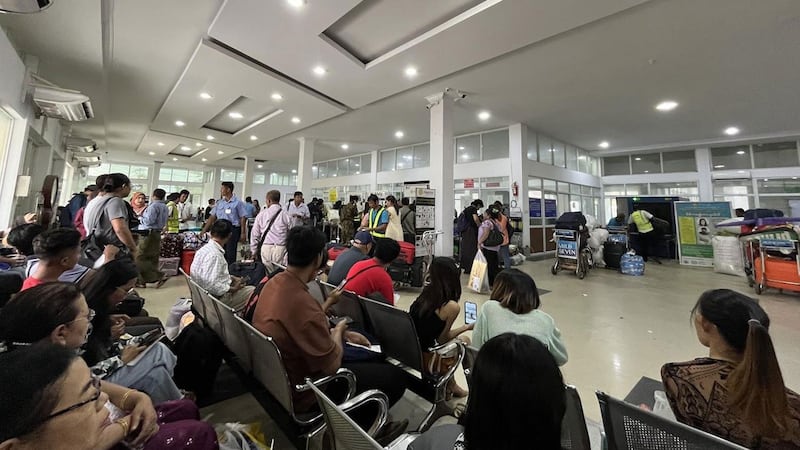The number of domestic commercial flights in Myanmar dropped by one-third in recent months after the military junta began seizing aircraft fuel from private airlines following stepped-up sanctions imposed by the United States, several ticketing agents told Radio Free Asia.
The expanded sanctions from the U.S. Treasury Department in August stated that any "foreign individual or entity" linked to procuring jet fuel for the military government can be targeted.
Airfares on flights within the country have become more expensive and some routes no longer have regular flights, a person from a domestic and international airline ticketing business, who didn’t want to be named for security reasons, told RFA.
“There are fewer flights, resulting in decreased connectivity, such as the suspension of flights to Tachileik,” the person said, naming a town in Shan state that sits next to a popular border crossing with Thailand.
Junta officials have most likely been expropriating jet fuel from airlines for military use, political observer Than Soe Naing said.
“After reserving the fuel to meet the military needs, the junta then distributes the left-over fuel for domestic flights,” he said.

Ko Mike, a spokesman for the Blood Money Campaign, a collective of Myanmar activists campaigning to stop revenue from reaching the junta, told RFA that he also believes that the junta has taken control of private aviation fuel.
“It’s not that there’s no jet fuel. They have it,” he said. “It’s quite obvious that they are using jet fuel to kill people. In their mind, they have no intention of using it for the public. They never think about it.”
Flights to Myitkyina
Armed resistance groups and non-governmental organizations in Myanmar have repeatedly called for a ban on companies that sell jet fuel to the military junta.
More than 3,900 civilians have been killed by the regime since it seized power in February 2021, the Treasury Department said in its announcement in August, with the junta relying on airstrikes against civilians, including women and schoolchildren, to maintain its hold on power.
A Treasury Department statement singled out two air strikes on civilians in the Sagaing region – one in April and one in June – as the impetus for the expansion of the sanctions.
The sanctions meant that American citizens and firms, including banks, can’t have any business relationship with those sanctioned.
There are five domestic airlines operating daily in the country – Myanmar Airways International, Air KBZ, Mann Yadanarpon, Air Thanlwin and the state-owned Myanmar National Airlines.
Flights from several airlines that used to run regularly between the commercial capital of Yangon and Myitkyina in northern Kachin state have been significantly reduced, and airfares on the route have risen from 260,000 kyat (US$124) to 430,000 kyat (US$205) over the last year, the person said.
A spokesperson from Air Thanlwin – known as Yangon Airways until a rebranding in 2019 – confirmed to RFA that its daily Yangon-Myitkyina flight has been suspended. The spokesperson couldn’t say when the airline’s flights on the route were expected to resume.
A resident of western Rakhine state said there are also fewer flights between Sittwe and Yangon. Recent fighting between junta troops and the Arakan Army in Rakhine has led to closed roads and waterways, which has only increased demand for air travel.
“Everyone has been facing hardship. But it’s difficult to travel, including travel for health issues,” the resident said. “If you are unable to get medical treatment in Sittwe, you have to go to Yangon, but now you can’t.”
RFA’s attempts to contact junta spokesman Major Gen. Zaw Min Tun and the junta’s Ministry of Transport and Communications for comment on the reduced number of flights went unanswered on Thursday.
Translated by Htin Aung Kyaw. Edited by Matt Reed and Malcolm Foster.
